#disclaimer: this is just my opinion as an autistic person i am ofc not saying it's a fact
Explore tagged Tumblr posts
Text
jfsp s9 might be about intergenerational relationships and family traditions and many other excellent things and, most importantly, about LOVE 💛 but we cannot ignore the fact that it is also about seven generations of autistic people
#jfsp#john finnemore's souvenir programme#john finnemore#autism stuff#ok actually maybe deborah and russ aren't but cliff and al are so it counts#can't believe it took me listening to it for the hundredth time to realise that it's not just newt and jerry#PATRICK NIGHTINGALE CHOOSING SEASIDE SOUNDS AS A DESERT ISLAND DISC?#disclaimer: this is just my opinion as an autistic person i am ofc not saying it's a fact#mine
23 notes
·
View notes
Text
An actual explanation as to why I think Jonah Beck from Andi Mack is autistic (by an autistic person)
Disclaimer every autistic person is different. This has become a popular hc in the fandom, and I am explaining why, based on my own traits and common signs and symptoms I've noticed in the character.
Hyperfixations:
Lots of autistic people have hobbies or special interests that they take really seriously they like to talk about it with other people even if they don't seem as interested or if its annoying them. Jonah's special interests were ultimate frisbee and guitar he would get so defensive if anyone said ultimate wasn't a sport, and he carried his frisbees with him a lot apparently even after he had stopped playing as much and when he took up guitar, he literally started wearing shirts with guitars on them bro found a new special interest and never looked back (its especially important bc it helps him cope with anxiety).
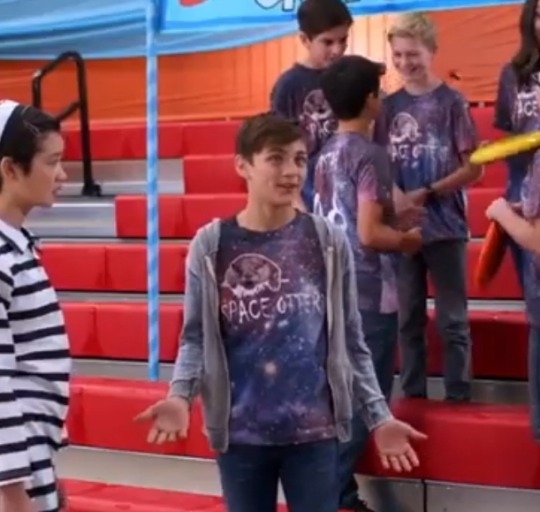
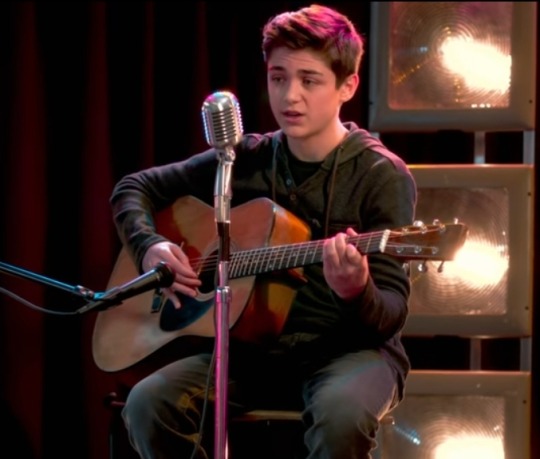

Social queues (lack of awareness)
Ik Jonah is sometimes comic relief and portrayed as oblivious, but he fr doesn't understand things like flirting like that scene from unloading zone when those girls were flirting with him and he just "Yeah uh... its free 🧍♂️😁". He also sometimes doesn't understand when something is really important to someone else, especially if he's concentrated on a special interest (when andi protested her school dress code in s1, for example). Also, just amber saying at some point, "If you want Jonah to not say anything, you have to be very explicit," and the fact that he accidentally got himself and the ghc in trouble in unloading zone.

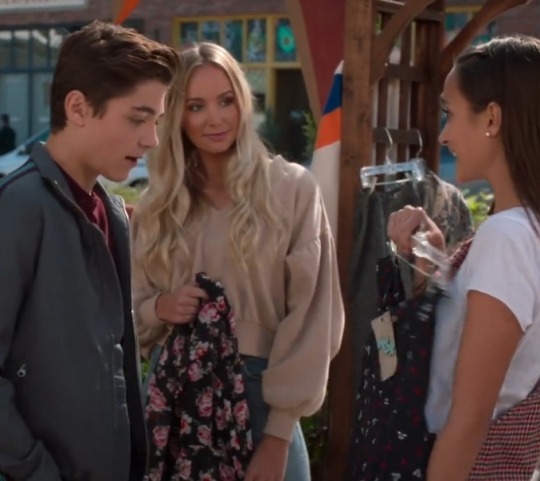
Anxiety/meltdowns/sensory aversions
ofc anyone can experience anxiety, and it's not a part of the diagnostic criteria, but lots of autistic people experience high levels of anxiety in later life. Jonah canonically has panic attacks and struggles with anxiety, which (in my opinion, anywho) can be taken for a meltdown, but like I said, everyone's different not all meltdowns are out of sadness sometimes they can be angry like when Jonah flipped that board game and said "now its over". I noticed he gets them in uncomfortable social situations that are overwhelming he also said on a few occasions that he doesn't like confrontations, which could be seen as too much sensory input, which causes meltdowns
And he has food aversions from again too much sensory input when at Cyrus' grandmothers shiva he says he couldn't recognise anything on the food table even tho there was literally a bagel in front of him and he ate the fish Cyrus told him not too eat. He also says he's embarrassed of his panic attacks. I'm embarrassed of meltdowns he's so me. Also, this whole discourse of people saying Jonah doesn't have feelings he does he just struggles expressing or processing them.
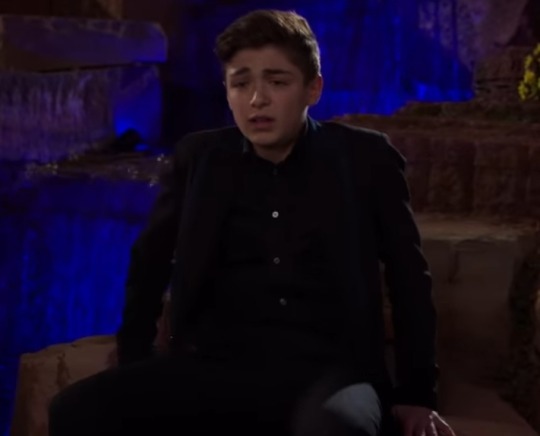
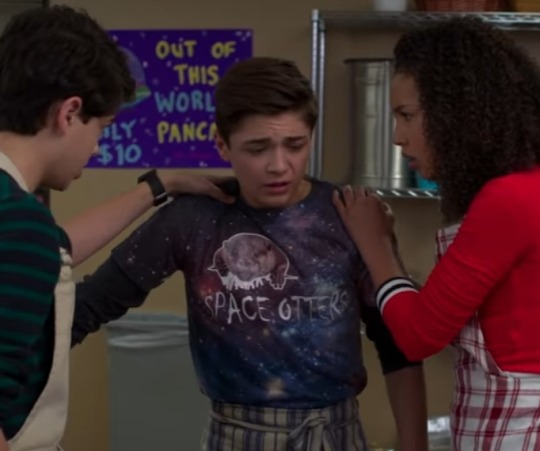
Face blindness/masking
Many autistic teens and children have face blindness or facial-agnosia, meaning they don't always recognise faces they've already seen or just identify people in different ways Jonah's little line in s1 "some people never forget a face, I never forget a foot" was enough proof for me. Also, masking is when an autistic person basically hides that they're autistic by suppressing certain behaviours around certain people, and I think Jonah does this a lot in s1 to keep up this mr. popular image when Buffy said he only had 2 facial expressions could be taken as a sign of masking. I noticed it seemed like he didn't have any other friends after s1 accept from the ghc this could be because he felt he didn't have to mask in front of them (as an autistic person masking is exhausting I don't blame him) he definitely feels least judged around Cyrus and Buffy.
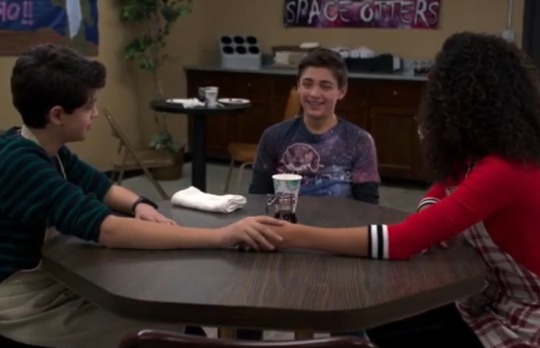
Stimming/repetition
Once again, it was likely for comedic purposes, but Jonah sometimes repeats things that have already been said, which is how some autistic people like to communicate whether it be repeating their words or echoing others (echolalia) I noticed Jonah do this in s3 when Buffy's talking about why she rejected Walker and he just says "I feel bad for the guy" like twice and I've noticed subtle stims when he's both nervous and happy Jonah is very expressive with his hands when he talks plus that trampoline park date must of been one fun sensory experience.
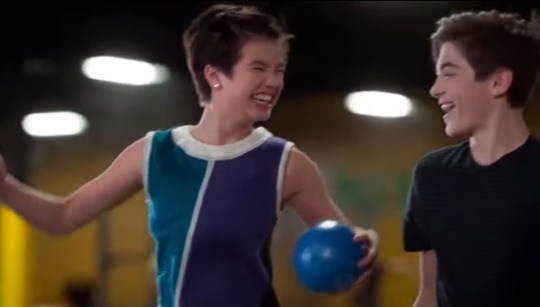
In conclusion:

#andi mack#disney channel#jonah beck#autistic jonah beck#autistic characters#autism#actually autistic#cyrus goodman#buffy driscoll#good hair crew#character analysis#panic attack#hyperfixation#endless list of favourite tv shows queue
138 notes
·
View notes
Note
Can you please share how it is in Korea in terms of disability rights? Particularly for autistic people, ofc
Hello anon! you are the first one to ask a question on me! Let's see if I can get this nicely :3
Before I start writing about this, I would like to put some disclaimer: I lived abroad for almost a decade when I was younger (5 years of secondary education and 4 years of university; I did come back to Korea every winter/summer vacation, though), and because I am autistic, I may misunderstand/be ignorant of some social norms prevalent in Korea. Just uh... don't generalize how Korea is just based on my response!
Koreans, In my opinion, are very kind. They LOVE helping others. Elders, especially. They love it so much that some even just help before it is explicitly asked. This "Helping others is must and you should appreciate other's help" social norm is so deeply rooted in Korea.
Also in Korea, there is a word "눈치(nun-chi)"(Wikipedia link here!), which means "an ability to recognize what is needed/what is actually meant for the person without explicitly talking about it." Basically it is a skill to figure out social norms, unspoken rules & other's intent, only using nonverbal communication and observation. Koreans value this so much: you can tell since there's a word for this. If you make person explicitly speak of their needs to you, then you're inconsiderate/uneducated/rude. If you speak directly about your opinion and thoughts (especially if it's negative), then you're inconsiderate of other's feelings. (And Koreans get hurt a lot by being rejected by others on the things they like. Aahh.) Elders tend to ask more of "눈치" than young peeps. It does not mean younger people are more forgivable to diversity though; they are trying to establish new social norms to replace what it was before. ev
Based on these t, the problem is, Koreans just tend to assume what others need at that moment without actually asking (because they don't want to be rude.) Some actually demand being helped without being asked first: "Hey don't you see I'm in trouble? why don't you help me!" or "You really need to ASK me? can't you just see?". Of course, it is ALSO rude to overlook other's needs, but then, even if you don't like other's help, you can't say you don't like it because of the reason stated above(appreciate other's help). Now coming to disability rights, non-disabled people just assume what would be needed for disabled rather than explicitly asking. This results the accommodation that is not actually helpful for disabled. It's really hard to get it right though, because there are always more people who think on the behalf of disabled people than actually disabled people. Oof.
To talk about autistic people in specific, it is not a visible disability, and society is not quite forgivable to whom lacks "눈치". Well, even NT struggles to fit into heavy peer pressure in Korea. There are plenty of questions are being asked "when is appropriate to do X and not to do Y in circumstances Z" in anonymous internet community and among friends even now. My mother keeps telling me that she is worried of my sister(Neurotypical, university student) not getting the job on time after graduated and missing out, because of how other people would speak about it. Korean NTs get anxious for how other people would think of them. Well for autistics? For autistics those are "autistic enough", they are pitied. Their parents speak on their behalf. For autistics those are "not autistic enough", their suffering is ignored or overlooked (because even NTs suffer from following social norms). It's the society that is full of misunderstanding, and people just try to fix it with equally opposite misunderstanding.
The society that lacks "agree to disagree". The society where people just bear the discomfort until it reaches the threshold, then blames everything when it does. The society where everybody suffers and thinking that it is natural to do so. I feel bad for them, not only disabled people, not only minorities, but just... everyone in general.
Hope this post answers your question.
37 notes
·
View notes
Note
Why do you accept non-explicit canon coded information such as Light was fucking Kiyomi and Misa but reject canon coded information like Near is autistic? I have no real investment in that debate, I don't personally see Near as autistic, but I'm just curious what you use to separate the two!
I appreciate the curiosity, but I have to admit I’m raising an eyebrow over the framing of this. I don’t actually reject what you’re saying I do. With all due respect this will be the last time I respond to questions of this nature as I feel as though I keep saying what my opinion is only for it to be distorted which is just not a fun experience.
I don’t disagree that you can view Near as autistic. I just think it requires headcanon that Near was symptomatic since infancy if that’s how you interpret the character. That’s not a rejection of autistic Near that is the objective reality of ASD. What I actually reject is the idea that any of this was intentional on Ohba’s part. Obviously I’m not a mind reader and can neither prove that nor am I a person who is particularly inclined to view authorial intent as be all end all regardless, so this really speaks more to my dissatisfaction with Ohba’s general sensitivity (or lack thereof more appropriately) in his portrayal of mental health in his published works. That, however, is a different discussion and not one I am particularly keen to have as I don’t think it’ll go anywhere productive or conclusive.
As for why I’d consider Light having sexual relationships with Misa and Kiyomi canon, there are a bunch of factors that go into it. DN was published in Shonen Jump and cannot be sexually explicit. By nature sexual relationships have to be coded in SJ. All the cues in the text suggest that Light is not a virgin and I don’t find the argument that he is more convincing. If anything, they tend to raise more questions than they answer.
But to get to the core of what you’re asking what I’d consider “canon” is something that’s either explicit or the most logically inferable without relying on an outside assumption – for example, the fact that Light cares about his family.
Headcanon is p much everything else, but there are gradations of headcanon, too? Like there’s “L’s favorite flower is hyacinth!!” flavors of headcanon where there’s just no canon to support it whatsoever, and then there’s “Light is asexual” which imo has a plethora of canon evidence to support it, but even then I would only seriously ever say “this is the most compelling interpretation of canon in my view and I am sticking to it though I can see how other views don’t contradict canon” but not “this is canon.” Unless I’m joking-not joking ofc! That’s about where autistic Near is for me. “yeah you can make a compelling argument for it, but I can see how other interpretations could also be viable.” That ofc, coming from someone who is not autistic as a disclaimer.
That all said….what people call canon or headcanon is pretty subjective and inconsequential, isn’t it? We can barely agree as a fandom on what materials are even “canon” to begin with considering there is hearty debate over shit like whether AN!Mello is canon to manga!Mello, whether AN!L is canon to manga!L, whether L in the photobook of Matsuyama’s L cosplay is canon to manga!L, etc etc, so I just personally don’t really consider how individuals categorize canon vs headcanon actually worth getting worked up over.
11 notes
·
View notes